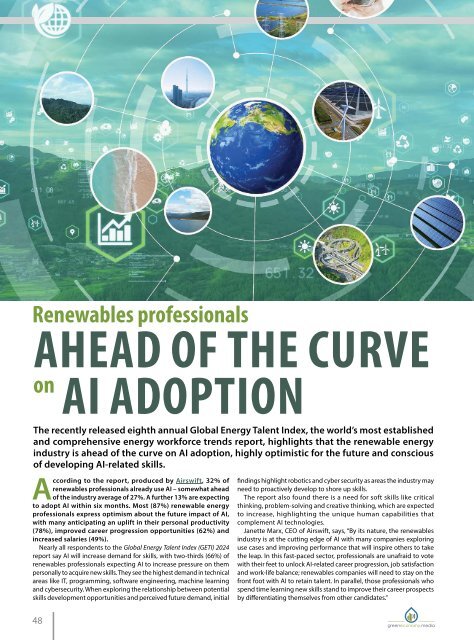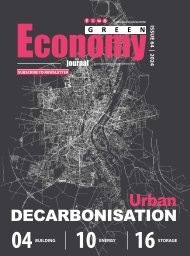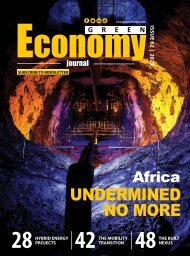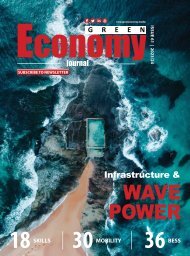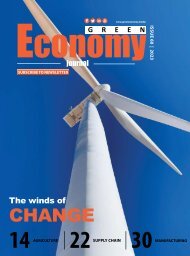Green Economy Journal Issue 63
Create successful ePaper yourself
Turn your PDF publications into a flip-book with our unique Google optimized e-Paper software.
Infographic<br />
While concerns exist about a lack of human touch, insufficient training<br />
and cybersecurity risks, each challenge that arises presents an even<br />
bigger opportunity for companies.<br />
“AI will create new challenges around data security and ownership,<br />
and questions remain over who owns the outputs. This is an opportunity<br />
for companies to reduce risks by harnessing AI’s predictive capabilities<br />
to boost cyber security,” says Marx.<br />
The renewables industry is at the<br />
cutting edge of AI.<br />
SALARIES AND GLOBAL MOBILITY<br />
Salaries in the renewables sector have rebounded above pre-pandemic<br />
figures, with 51% of professionals reporting a pay increase – a notable<br />
rise from 47% last year. This upward trajectory in compensation aligns<br />
with the accelerating clean energy transition. Moreover, amid the global<br />
push for decarbonisation, companies are increasingly offering overseas<br />
job transfers, now at 58% compared to 52% in 2022.<br />
Continuing a trend identified last year, the report reveals an intense<br />
competition for talent in renewables. Approximately 32% of workers<br />
have been headhunted six or more times, with many receiving offers<br />
from outside the industry. This is reciprocated by 88% of workers<br />
considering job switches, driven by career progression opportunities<br />
and broader industry interest.<br />
AI and the the Future Future of Skills of in Skills the Energy Industry<br />
SKILLS<br />
in Renewable Energy<br />
Personal impact of AI in<br />
the next two years:<br />
51%<br />
of non-hiring<br />
professionals report<br />
a pay rise this year.<br />
78%<br />
say productivity<br />
will increase.<br />
62%<br />
say job satisfaction<br />
will increase.<br />
62%<br />
say career and progression<br />
opportunities will increase.<br />
Top four skills<br />
that are in demand<br />
1<br />
2<br />
3<br />
4<br />
Programming /<br />
software engineering<br />
IT<br />
Machine learning<br />
Cyber security<br />
79%<br />
are open to<br />
relocating for work,<br />
with Europe the top<br />
choice.<br />
32%<br />
of respondents use<br />
artificial intelligence<br />
in their role.<br />
AI and the future of skills in renewable energy.<br />
Top three uses of AI in<br />
the renewables sector<br />
Top four skills<br />
that may be developed<br />
Machine learning<br />
Data science<br />
IT<br />
Automated workflow<br />
and workplace<br />
collaboration tools.<br />
Data analytics to<br />
optimise energy<br />
production.<br />
Customer<br />
engagement.<br />
Critical thinking /<br />
problem solving<br />
GETI, the world’s largest energy recruitment and employment trends report, this year surveyed 11,800 energy professionals and hiring managers in 149 countries.<br />
1<br />
2<br />
3<br />
4<br />
GETI<br />
Renewables professionals<br />
AHEAD OF THE CURVE<br />
on<br />
AI ADOPTION<br />
The recently released eighth annual Global Energy Talent Index, the world’s most established<br />
and comprehensive energy workforce trends report, highlights that the renewable energy<br />
industry is ahead of the curve on AI adoption, highly optimistic for the future and conscious<br />
of developing AI-related skills.<br />
POWER SECTOR<br />
Despite apparent satisfaction with salaries and steady appetite for regional relocation, professionals<br />
are not completely rooted in place: 91% are open to moving roles, the highest of the survey’s<br />
sectors. Furthermore, while most prefer to stay within the power sector (58%), 44% are open<br />
to going elsewhere within the energy industry, and 23% would consider roles in a new sector<br />
altogether. As was the case last year, renewable energy is the sector of choice (cited by 54%),<br />
followed by oil and gas (36%). Beyond energy, 35% would move to the technology sector.<br />
Manufacturing is becoming steadily more attractive, having been selected by 11% in 2022,<br />
16% in 2023 and now 19% in 2024.<br />
The reasons for moving roles mimic those for moving regions: career progression is the<br />
primary motivator (chosen by 27%), though by much less than last year (38%). Interest in the<br />
wider industry is second (15%), and the chance to work with innovative technology takes third<br />
place (12%), eclipsing ESG concerns which plummeted to seventh place this year.<br />
Commenting on the findings, Wenche Kjølås, independent director at several companies, says: “A<br />
picture of fragile stability. Salary growth is good but not spectacular, and though career progression<br />
remains a top concern, professionals seem less convinced they need to make a move than last year<br />
to continue their career trajectory. Yet, openness to moving roles and regions is high, indicating a<br />
sector where professionals are settled but wouldn’t take much prompting to reconsider. As a wellestablished<br />
industry, power professionals are self-assured and have much to offer other sectors.”<br />
Hiring managers should take note: 81% of employees have been approached for another role in<br />
the last year, while over a third (34%) have been approached six times or more. A significant minority<br />
(19%) have received 11 or more approaches, with over one-third of respondents saying more than<br />
half of these approaches came from beyond the power sector.<br />
According to the report, produced by Airswift, 32% of<br />
renewables professionals already use AI – somewhat ahead<br />
of the industry average of 27%. A further 13% are expecting<br />
to adopt AI within six months. Most (87%) renewable energy<br />
professionals express optimism about the future impact of AI,<br />
with many anticipating an uplift in their personal productivity<br />
(78%), improved career progression opportunities (62%) and<br />
increased salaries (49%).<br />
Nearly all respondents to the Global Energy Talent Index (GETI) 2024<br />
report say AI will increase demand for skills, with two-thirds (66%) of<br />
renewables professionals expecting AI to increase pressure on them<br />
personally to acquire new skills. They see the highest demand in technical<br />
areas like IT, programming, software engineering, machine learning<br />
and cybersecurity. When exploring the relationship between potential<br />
skills development opportunities and perceived future demand, initial<br />
findings highlight robotics and cyber security as areas the industry may<br />
need to proactively develop to shore up skills.<br />
The report also found there is a need for soft skills like critical<br />
thinking, problem-solving and creative thinking, which are expected<br />
to increase, highlighting the unique human capabilities that<br />
complement AI technologies.<br />
Janette Marx, CEO of Airswift, says, “By its nature, the renewables<br />
industry is at the cutting edge of AI with many companies exploring<br />
use cases and improving performance that will inspire others to take<br />
the leap. In this fast-paced sector, professionals are unafraid to vote<br />
with their feet to unlock AI-related career progression, job satisfaction<br />
and work-life balance; renewables companies will need to stay on the<br />
front foot with AI to retain talent. In parallel, those professionals who<br />
spend time learning new skills stand to improve their career prospects<br />
by differentiating themselves from other candidates.”<br />
READ REPORT<br />
THOUGHT [ECO]NOMY<br />
The Global Energy<br />
Talent Index Report<br />
2024<br />
greeneconomy/report recycle<br />
THE GLOBAL ENERGY TALENT INDEX 2024 | GETI | Airswift | energyjobline | [2023]<br />
The Global Energy Talent Index (GETI) was launched in 2017 to chart emerging trends across the<br />
global energy workforce. GETI has since drawn on insights from thousands of professionals to create<br />
a comprehensive map of a changing energy landscape.<br />
This year’s report explores how the rise of artificial intelligence (AI) is reshaping everything from job roles<br />
to skills in demand and whether workplace policies and training priorities are keeping up. GETI tracks the<br />
extent of AI adoption, popularity and policy awareness across the industry and anticipates the major risks<br />
and opportunities it presents. This report surveys an industry on the cusp of a technological revolution.<br />
Building on the success of the seven previous volumes, GETI 2024 draws on the views of almost 12 000<br />
energy professionals in 149 different countries. The 55-question survey was open for nine weeks and closed<br />
at the end of October 2023. It aims to provide insights that will help hiring managers and professionals alike<br />
to better understand how AI is changing jobs, and what skills will be most prized in the future.<br />
48 49


